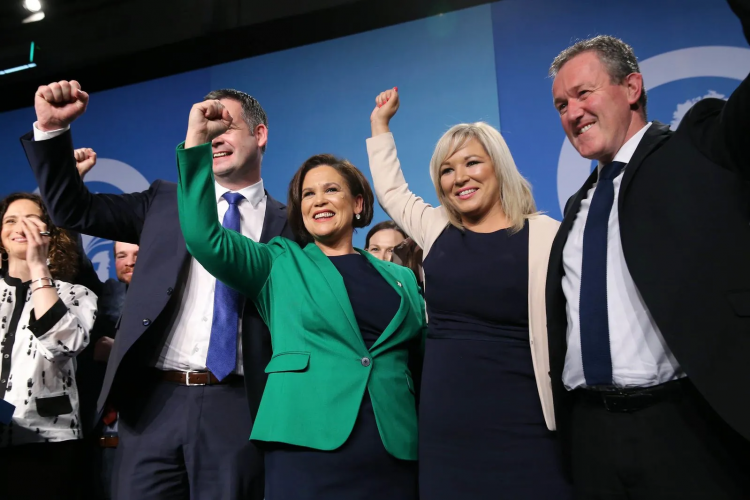Sinn Fein takes a pragmatic approach to victory in Northern Ireland In the polls, the Nationalist Party leads the way, but it rarely mentions its goal of uniting Ireland. “People ‘s priority now is the economy and livelihood, and we’re with the people,” said Sinn Fein chairman (Mary Lou McDonald) while introducing the candidates. Sinn Fein’s all-encompassing focus on voters’ core concerns, such as housing, health and employment, has put the party at the forefront of electoral polls and on the verge of gaining power in Northern Ireland and the Republic of Ireland by 2025, the year Irish elections to be held.
What is the role of Sinn Fein in the election process in Ireland?
In Ireland, Sinn Féin is attempting to form a coalition with other left-wing parties after a stunning victory in the general election in which the party won the popular vote. The final count of the vote revealed that Sinn Féin took 37 parliamentary seats, putting it just one seat behind centre-right party Fianna Fáil. Sinn Féin, which originally formed as the political wing of the IRA, focused its campaign on social issues including housing, homelessness and healthcare. This is Mary Lou McDonald, president of Sinn Féin. “You know, it’s a big statement of change. It is a big statement that this is no longer a two-party system. It’s a statement that people want a different type of government and that people have great confidence in us. And I say that with all humility.” The surprising results of this election are illustrative of three broader trends: the growth of nationalist and separatist movements in Europe; the erosion of centrist, two-party consensus democracies; and the destabilizing impact of Brexit on the British Isles. Sinn Féin, which operates in both Ireland and Northern Ireland, is a left-wing, nationalist, populist, republican party. Its success is particularly stunning as it was once a pariah in Irish politics due to its historical role as the political wing of the Provisional Irish Republican Army, which was responsible for a great deal of violence during the Northern Ireland conflict in the late-20th century. While the party remains tainted by suspicion and scandal surrounding its links to the IRA, Saturday’s victory shows that as far as voters are concerned, Sinn Féin is mainstream enough to govern.
In recent years, particularly since Mary Lou McDonald succeeded the long-serving and controversial party leader Gerry Adams in 2018, the party has reformed itself by downplaying its historical militancy and focusing attention on its social-democratic policy agenda. Sinn Féin remains solidly committed to Irish reunification, but McDonald’s campaign platform this year focused on social and economic issues like homelessness, rising rents, healthcare costs, and hospital waiting lists. Sinn Féin won by tapping into popular anger over these issues and focusing that anger on the “duopoly” of the two mainstream centrist parties, Fine Gael and Fianna Fáil.
How popular is the Sinn Fein among Irish people?
During the conflict known as the Troubles, Sinn Fein was seen widely as the political wing of the republican movement that also included the Provisional IRA, though it never formally confirmed the association. The fighting was triggered by street protests in 1968 and claimed about 3,500 lives through to the Good Friday agreement. Sinn Fein’s leaders Gerry Adams and Martin McGuinness helped to negotiate the peace deal and moved into the government in Northern Ireland. It’s been the biggest nationalist group in the north’s power-sharing assembly since 2003, and opinion polls suggest it will overtake the Democratic Unionists as the largest party in an election on May 5. If it does, Sinn Fein could get to choose the region’s first minister for the first time since the Good Friday accord, a seismic shift in a region historically dominated by parties loyal to Britain South of the border in the Republic of Ireland, Sinn Fein has moved from fringe to mainstream after doubling its vote between 2007 and 2016.
In 2020, Fine Gael and Fianna Fail — the two parties that have largely dominated Irish politics since the state’s foundation had to form a coalition to keep Sinn Fein out of power. Wrangling over how to keep trade flowing with EU-member Ireland after Britain’s departure from the European Union has made Northern Ireland’s position within the U.K. a major issue once more, playing into the party’s key message. Brexit has also sown discord within Sinn Fein’s arch-rival the DUP, which has lost voters to other unionist parties and centrists. The May 5 election could help to determine the region’s final post-Brexit arrangements as the assembly gets to vote on the issue in 2024 and has the power to scrap the status quo altogether. In the south, Fianna Fail and Fine Gael’s support for each other since 2016 has allowed Sinn Fein leader Mary Lou McDonald to present herself as the only true agent of change. The party is especially popular among younger voters who were hit hardest by a housing shortage and have little memory of the Troubles. Sinn Fein wants planning to begin a referendum on reunifying the island. In Northern Ireland, it’s also campaigning on a promise to help voters deal with the soaring cost of living. In the republic, it wants to freeze residential rents and increase government spending on new homes. It plans to abolish property levies, close corporate tax loopholes, ensure the rich contribute more in tax and cut the official age of retirement.
Will Northern Ireland be ruled by a single party?
On 5 May, the next Northern Ireland Assembly election will take place. As with any election, for the political parties doing battle, there is much at stake. But in Northern Ireland, it’s not simply winner-takes-all once votes have been counted and the final seats declared. Forming a government and deciding policy priorities are the traditional outcomes after elections when parties have made promises to deliver on pledges. But doing that is more complicated in Northern Ireland for one big reason: no party can govern alone. There’s no such thing as winning an outright majority or forming a “coalition of the willing”, with like-minded parties. That’s different from how things usually work in other parts of the UK, but it was purposefully designed this way.
Often just referred to as Stormont, Northern Ireland’s modern institutions were set up to ensure unionists and nationalists could share power equally, ending decades of conflict known as the Troubles. It has operated like this since the first election to the devolved assembly took place in 1998. There are 90 seats available in the assembly, the legislative chamber where laws are scrutinised and passed. But forming the government at Stormont which proposes many of the laws is less straightforward. It’s a system known as a mandatory coalition. It means major parties cannot be excluded from government. In practice, this sees parties with opposing political stances having to work together on everything from health to infrastructure and education. Unionist parties favour continuing the union with Britain while nationalist parties support a united Ireland. There is also a growing third bloc of non-aligned parties who, so far, have not taken a position on that issue. After an election, those parties are meant to form the executive.
Conclusion.
Sinfin party leaders are working very hard 4 the unification of Ireland. They are focusing on the core concerns such as housing health and employment and thus gaining power in Northern Ireland and the Republic of Ireland. Besides they’re taking a sensible approach towards victory in Northern Ireland. A pretty smart amount of voters in Northern Ireland are happy with the work done by the sin fin party. But as the current situation is concerned in Northern Ireland, it cannot be ruled or governed by a single party rather it can be governed by a coaliation government. No single party alone can govern the whole of Ireland. Sinfin leaders should take some serious steps to persuade the unionists to get rid of the United Kingdom in the coming elections.





























